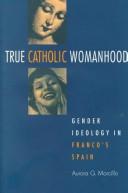| Listing 1 - 7 of 7 |
Sort by
|
Book
ISBN: 9789004259959 Year: 2014 Volume: 93 Publisher: Leiden [etc.] Brill
Abstract | Keywords | Export | Availability | Bookmark
 Loading...
Loading...Choose an application
- Reference Manager
- EndNote
- RefWorks (Direct export to RefWorks)
Collective memory --- Mémoire collective --- Spain --- Espagne --- History --- Influence. --- Social aspects. --- Histoire --- Influence --- Guerre civile, 1936-1939 --- Aspect social --- Mémoire collective

ISBN: 0875802567 Year: 2000 Publisher: DeKalb Northern Illinois university press
Abstract | Keywords | Export | Availability | Bookmark
 Loading...
Loading...Choose an application
- Reference Manager
- EndNote
- RefWorks (Direct export to RefWorks)
Onder het regime van Franco en zijn programma van Nationaal Katholicisme stonden vrouwen in het midden van de pogingen van het regime om de traditie te bewaren terwijl ook modernisering gepromoot werd. Hoewel er een door de staat gesponsorde economie een moderne consumentenmaatschappij gecreëerd werd, schreven door de kerk beïnvloede wetten en instituties de vrouwelijke huiselijkheid voor en werden voor vrouwen idealen van aseksualiteit, zelfopoffering en beperkte onderwijsmogelijkheden aangemoedigd. De auteur bekijkt de spanningen tussen de verwachtingen voor de traditionele vrouw en de moderne consumentenhuisvrouw van de jaren 1950 en 1960.
Catholic women --- Women --- Human females --- Wimmin --- Woman --- Womon --- Womyn --- Females --- Human beings --- Femininity --- Women, Catholic --- Christian women --- History --- Government policy --- Social conditions --- Political philosophy. Social philosophy --- Christian religion --- Sociology of the family. Sociology of sexuality --- Community organization --- Political systems --- anno 1900-1999 --- Spain --- Authoritarianism --- Catholic Church --- Nationalism --- Images of women --- Women's organizations --- Book
Book
ISBN: 9004259961 9789004259966 9789004259959 9004259953 1306087503 Year: 2014 Publisher: Leiden Boston
Abstract | Keywords | Export | Availability | Bookmark
 Loading...
Loading...Choose an application
- Reference Manager
- EndNote
- RefWorks (Direct export to RefWorks)
The authors in this anthology explore how we are to rethink political and social narratives of the Spanish Civil War at the turn of the twenty-first century. The questions addressed here are based on a solid intellectual conviction of all the contributors to resist facile arguments both on the Right and the Left, concerning the historical and collective memory of the Spanish Civil War and the dictatorship in the milieu of post-transition to democracy. Central to a true democratic historical narrative is the commitment to listening to the other experiences and the willingness to rethink our present(s) in light of our past(s). The volume is divided in six parts: I. Institutional Realms of Memory; II. Past Imperfect: Gender Archetypes in Retrospect; III. The Many Languages of Domesticity; IV. Realms of Oblivion: Hunger, Repression, and Violence; V. Strangers to Ourselves: Autobiographical Testimonies; and VI. The Orient Within: Myths of Hispano-Arabic Identity. Contributors are Antonio Cazorla-Sánchez, Álex Bueno, Fernando Martínez López, Miguel Gómez Oliver, Mary Ann Dellinger, Geoffrey Jensen, Paula A. de la Cruz-Fernández, María del Mar Logroño Narbona, M. Cinta Ramblado Minero, Deirdre Finnerty, Victoria L. Enders, Pilar Domínguez Prats, Sofia Rodríguez López, Óscar Rodríguez Barreira, Nerea Aresti, and Miren Llona. Listed by Choice magazine as one of the Outstanding Academic Titles of 2014
Collective memory --- Collective remembrance --- Common memory --- Cultural memory --- Emblematic memory --- Historical memory --- National memory --- Public memory --- Social memory --- Memory --- Social psychology --- Group identity --- National characteristics --- Spain --- Espagne --- Espainiako Erresuma --- España --- Espanha --- Espanja --- Espanya --- Estado Español --- Hispania --- Hiszpania --- Isupania --- Kingdom of Spain --- Regne d'Espanya --- Reiaume d'Espanha --- Reino de España --- Reino d'Espanya --- Reinu d'España --- Sefarad --- Sepharad --- Shpanie --- Shpanye --- Spanien --- Spanish State --- Supein --- イスパニア --- スペイン --- History --- Influence. --- Social aspects.
Book
ISBN: 3839452570 3837652572 Year: 2022 Publisher: Bielefeld transcript Verlag
Abstract | Keywords | Export | Availability | Bookmark
 Loading...
Loading...Choose an application
- Reference Manager
- EndNote
- RefWorks (Direct export to RefWorks)
Which everyday practices allowed women to sustain and fulfill individuality and agency under dictatorial rule? This book adds to a rich scholarship on the history of late Francoism and the transition to democracy in Modern Spain through the lens of oral history and life writing. Aurora Morcillo tells the stories of anonymous individuals from both student and working class backgrounds - crucial sites of active resistance against the dictatorship at the time - and provides an interdisciplinary feminist analysis of the inevitable modernization of Spain in the 1960s and 1970s. This study uncovers a Deleuzian rendition of historical unfolding/becomingrather than simply a collection of oral histories: a historical narration which proposes to be a creative historical ontology.
HISTORY / Europe / General. --- Contemporary History. --- Cultural History. --- Culture. --- European History. --- Gender History. --- Gender. --- History of the 20th Century. --- History. --- Memory. --- Modern Spain. --- Society. --- Spain. --- Women --- Government, Resistance to --- History --- Spain --- Post-1945 Europe --- Culture --- Gender --- Memory --- Modern Spain --- Cultural History --- Society --- European History --- Gender History --- History of the 20th Century --- Contemporary History
Book
ISBN: 9780875809977 0875809979 Year: 2008 Publisher: DeKalb: Northern Illinois University Press,
Abstract | Keywords | Export | Availability | Bookmark
 Loading...
Loading...Choose an application
- Reference Manager
- EndNote
- RefWorks (Direct export to RefWorks)
Women --- Women --- Catholic women
Book
ISBN: 0838757537 0838758231 Year: 2010 Publisher: Associated University Presses
Abstract | Keywords | Export | Availability | Bookmark
 Loading...
Loading...Choose an application
- Reference Manager
- EndNote
- RefWorks (Direct export to RefWorks)
Book
ISBN: 9781474268967 Year: 2018 Publisher: London Bloomsbury
Abstract | Keywords | Export | Availability | Bookmark
 Loading...
Loading...Choose an application
- Reference Manager
- EndNote
- RefWorks (Direct export to RefWorks)
| Listing 1 - 7 of 7 |
Sort by
|

 Search
Search Feedback
Feedback About UniCat
About UniCat  Help
Help News
News